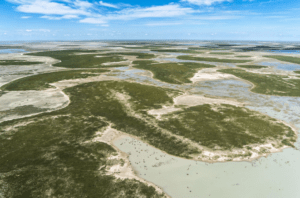
A controversial new study claims that ancient wetlands south of the Zambezi River were the oasis from which all modern humans emerged. Today, the region is one of the world’s largest salt flats known as the Makgadikgadi pans.
Credit: Beverly Joubert/Nat Geo
A powdery white layer blankets the desiccated landscape of Botswana’s Makgadikgadi pans, one of the world’s largest salt flats. But some 200,000 years ago, this blank canvas would have been painted in the blues and greens of a flourishing wetland. Set in the middle of a harsh desert in southern Africa, the lush landscape would have been an appealing place for early humans to call home.
Now, a controversial new study in Nature argues that this oasis, known as the Makgadikgadi–Okavango wetland, was not just any home, but the ancestral “homeland” for all modern humans today. The researchers studied mitochondrial DNA—genetic material stored in the powerhouse of our cells that is passed from mother to child—of current residents across southern Africa. Then they layered the genetic data […]











Researchers are still off by about 800,000 years. Back, back, back, gone.